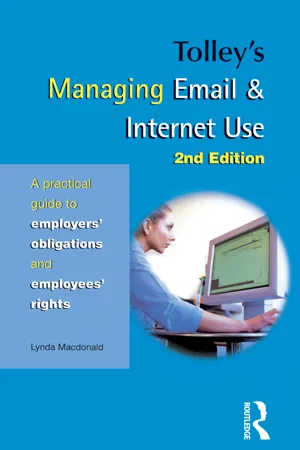Employee Monitoring
Employee monitoring refers to the practice of using technology to track and observe employee activities in the workplace. This can include monitoring internet usage, email communications, computer screen activity, and even physical location through GPS tracking. The purpose of employee monitoring is often to ensure productivity, security, and compliance with company policies, but it can also raise ethical and privacy concerns.
7 Key excerpts on "Employee Monitoring"
- eBook - ePub
Ethical and Legal Issues in Human Resource Development
Evolving Roles and Emerging Trends
- Claretha Hughes(Author)
- 2018(Publication Date)
- Palgrave Macmillan(Publisher)
...D’Urso (2006) described electronic monitoring as the use of electronic devices such as cameras, recorded phone systems, video and computer systems to store, monitor, and analyze employee behaviors or job performance. Electronic monitoring also provides methods for organizations to identify inefficiencies in processes and discover any misuse of electronic communications. It can also detect when an employee is using technology for personal use during paid work time—which costs US corporations approximately $85 billion in lost productivity (Alder, Noel, & Ambrose, 2006). However, there is no measure of the amount of work employees perform using technology when they are off the clock. For example, no one measures the amount of time faculty members spend responding to students’ emails and other forms of electronic communication when not at work. Video surveillance, global positioning system (GPS) monitoring, phone call monitoring (Holman, 2002), email, social media communication, and computer keystroke assessments (Anandarajan & Simmers, 2005 ; Baker, 2008a, 2008b) are but a few of the ways being used to monitor employees in the workplace. The old tried and true eavesdropping on employees’ conversations is also still relevant in open workspaces. The capturing of information is a concern to employers but just as concerning is the sharing of employees’ information without their consent. Employers’ and employees’ viewpoints on electronic monitoring differ with employers believing that there is a business need to protect their interests, while employees and their supporters believe it to be a violation of employees’ rights (Alder, 1998 ; D’Urso, 2006 ; Tabak & Smith, 2005). US federal laws prohibit covert electronic monitoring of employees efforts and do not restrict monitoring of employees in general (Alder et al., 2006 ; Bates & Holton, 1995)...
- eBook - ePub
- Kofi Aninakwa(Author)
- 2020(Publication Date)
- Page Publishing, Inc.(Publisher)
...The restaurant is cleaned properly, and work is being completed by them efficiently. Similar to the case of Elmore, video systems help employers find out what their workers are up to when they are away. With this, they can differentiate between inefficient and efficient workers. Workers at the restaurant even take long breaks, which means low productivity and impacted sales of the restaurant. Hence, using a video system to monitor employees at work is a great idea to make sure the workers are doing up to the mark (Yerby 2013). Although using video systems when the boss is away is helpful, it can lead to numerous difficulties for the employers. The use of video systems for Employee Monitoring should adhere to certain ethics and legislations. The first ethic linked to Employee Monitoring includes putting a set of written policies in place. The policy must be able to make rights and responsibilities clear to everyone. In order to develop that policy, employers must determine the level of risk involved and also employee expectations. The second ethic is to inform the workforce regarding the monitoring so that they can be made aware about it (Yerby 2013). They should have a fair idea that they are being monitored at work. The third ethic is to limit the use of technology at work such as restricting the access of some websites including social sites and porn sites that could result in the development of an unhealthy organizational culture. Employee Monitoring is a key requirement in every organization amid high competition, but it can sometimes lead to resentment among employees. There are high chances that the employees may feel hurt and disengaged from work when they know they are being monitored by someone at work. It can, hence, impact the morale of the employees. There is a chance that Employee Monitoring could lead to the learning of religion, sexual orientation, political views, etc., of the employees, which is a breach of contract on the part of the employer...
- eBook - ePub
- Lynda Macdonald(Author)
- 2009(Publication Date)
- Routledge(Publisher)
...It is all too easy for employers in today’s technological world to conduct monitoring without considering whether it is really necessary. The temptation to do so without first weighing up the business need against the privacy rights of the employees should be avoided. The legal issues relating to restrictions on monitoring should also be weighed up against the legal risks of a failure to monitor. Whilst no employer would wish to be perceived as ‘big brother’, most employees will be capable of understanding the need to conduct a reasonable amount of monitoring (provided of course that managers explain the employer’s position, and the reasons for monitoring, clearly). The Purposes of Monitoring [6.5] An employer may legitimately wish to monitor employees’ use of communication systems for any of the following reasons: to provide a record of transactions capable of forming contractual agreements, whether by telephone, email or through business deals conducted on the internet; to ensure employees who deal with customers on the telephone conduct themselves in a professional and consistent manner and in a way that meets the quality standards of the organisation; to identify whether there is a need for training, or further training, of employees, particularly those who communicate with customers by telephone or email; to gain access to telephone or email messages relevant to the business whilst an employee is absent from work, for example on holiday or off sick...
- Steven G. Rogelberg(Author)
- 2016(Publication Date)
- SAGE Publications, Inc(Publisher)
...Electronic monitoring now affects the majority of white-collar workers in developed countries, assuming those workers are employed in organizational environments that use networking technology and computers. These organizations generally do not use the monitoring to enforce difficult productivity standards, and thus the effects of monitoring on worker health, if present at all, are likely to be much more subtle and indirect. Instead, the major concern that has arisen pertains to privacy and expectations about nonproductive workplace behavior. Norms, laws, and regulations pertaining to worker privacy vary substantially from country to country and from region to region. For example, in the United States, workers generally enjoy few legal- or regulatory-based privacy protections on the job, whereas in the European Union, such protections are much more extensive...
- eBook - ePub
- Mathias Klang, Andrew Murray, Mathias Klang, Andrew Murray(Authors)
- 2016(Publication Date)
- Routledge-Cavendish(Publisher)
...All aspects of an employee’s behaviour at work can now be monitored, often without the employee knowing that the surveillance is taking place. In the last few years, employee surveillance has become more sophisticated, more insidious and more pervasive than ever before. 2 Monitoring employees’ telephone calls, email and Internet use is a particularly emotive and controversial issue. Not only is it one of the emerging legal issues of our time, but it is also a pressing practical problem in the day-to-day management of employment relationships. Many employees seem to regard their ability to make private telephone calls or to send private emails from their work as an unassailable right. On the other hand, many employers think that they have an unfettered right to information about what their employees are doing during their working hours. This chapter is about how the law in the UK attempts to reconcile these two different perspectives. 3 The last few years have seen the introduction of several major pieces of legislation in the UK, which have had a direct impact on this issue. As we shall see, these pieces of legislation do not provide a unified or coherent system of regulation. The legislative provisions are confusing, and at times even conflicting. In an attempt to provide some guidance on the matter, the Information Commissioner has published a Code of Practice on Monitoring at Work, which we shall consider towards the end of the chapter. We begin our analysis by considering the common law. Despite an enormous amount of statutory intervention over the last 30 years, the employment relationship is still essentially one of contract and is regulated at common law by various implied terms. These terms operate independently of legislation and the content of any written statement of employment terms and conditions...
- eBook - ePub
Vetting and Monitoring Employees
A Guide for HR Practitioners
- Gillian Howard(Author)
- 2017(Publication Date)
- Routledge(Publisher)
...Cyberskiving, that is, employees wasting their work time on the internet, was also high on the list of complaints by employers with 40 per cent of companies referring to this issue in the survey and 9 per cent of these complaints concerned discriminatory emails. Reasons Why Employers May Wish to Monitor and Record Communications at Work Firstly, for sound business reasons the employer may wish to monitor and control what employees are writing or saying by telephone. Legally binding contracts can be formed either orally or in writing by email. Secondly, some dishonest employees may try to disclose or ‘sell’ confidential information or may be involved in other dishonest activities, using the telephone or email system at work to do so. Thirdly, employees who post defamatory notices on websites, orsending offensive or libellous emails (sometimes with offensive attachments downloaded from the internet) can lead to serious legal penalties for the employer. Fourthly, there may be health and safety reasons for example, where workers work alone or in isolated locations. Fifthly, employers may seek to protect their workers and customers by recording telephone calls (to ensure that there is a faithful record of what has been said) and monitoring emails in order to prove whether an order was sent and received and so on, if done by email. The Law There are several statutes and sets of regulations and a Data Protection Code of Practice regulating the legality of monitoring and/or recording telephone calls, emails and the internet at work and using closed-circuit television (CCTV) to record and monitor the activities of those at work. RIPA The Regulation of Investigatory Powers Act 2000 (RIPA) was enacted in 2000 as part of the UK’s response to Article 5 of the Telecommunication Data Protection Directive (EU 97/66)...
- eBook - ePub
- J. G. Frye(Author)
- 2019(Publication Date)
- Austin Macauley Publishers(Publisher)
...Chapter 20 Monitoring Efficiency of Work The overall performance and positive impact your front-line care team are having on your service users, and consequently, the associated benefits to your organisation, should be a principal role function target and a clear KPI of your effectiveness as a supervisor. So, how do you go about monitoring your carers’ effectiveness whilst on duty? What are the risks concerning privacy? How do you avoid potentially undermining that all important trust factor? These and other considerations will need to be evaluated to ensure that you are not only running a tight ship, but you can navigate safely through choppy waters, every now and then. Often the employee’s perception is that far from monitoring their effectiveness, it is they and not what they do that is under surveillance – this is clearly not your aim, nor that of your organisation’s. However, perception is a strong reality, so clarity and standards will need to be made clear from the word go. So, choosing to monitor your team’s activities (and this is what it is) can have both positive and negative consequences. While it will be a deterrent in employee misuse of company resources, there’s also, as we have outlined, the important matter of encouraging employee lack of trust. Too much monitoring could create an unwanted sense of the proverbial Big Brother that could create tangible unease within your team, or at the other end of the emotional scale, outrage! Nevertheless, there must be performance standards and behaviours that are implemented to benefit your operation and the professional development of your charges. Usually, the Internet is often a weak link when it comes to misuse; with so many social centric websites, it is not surprising...






